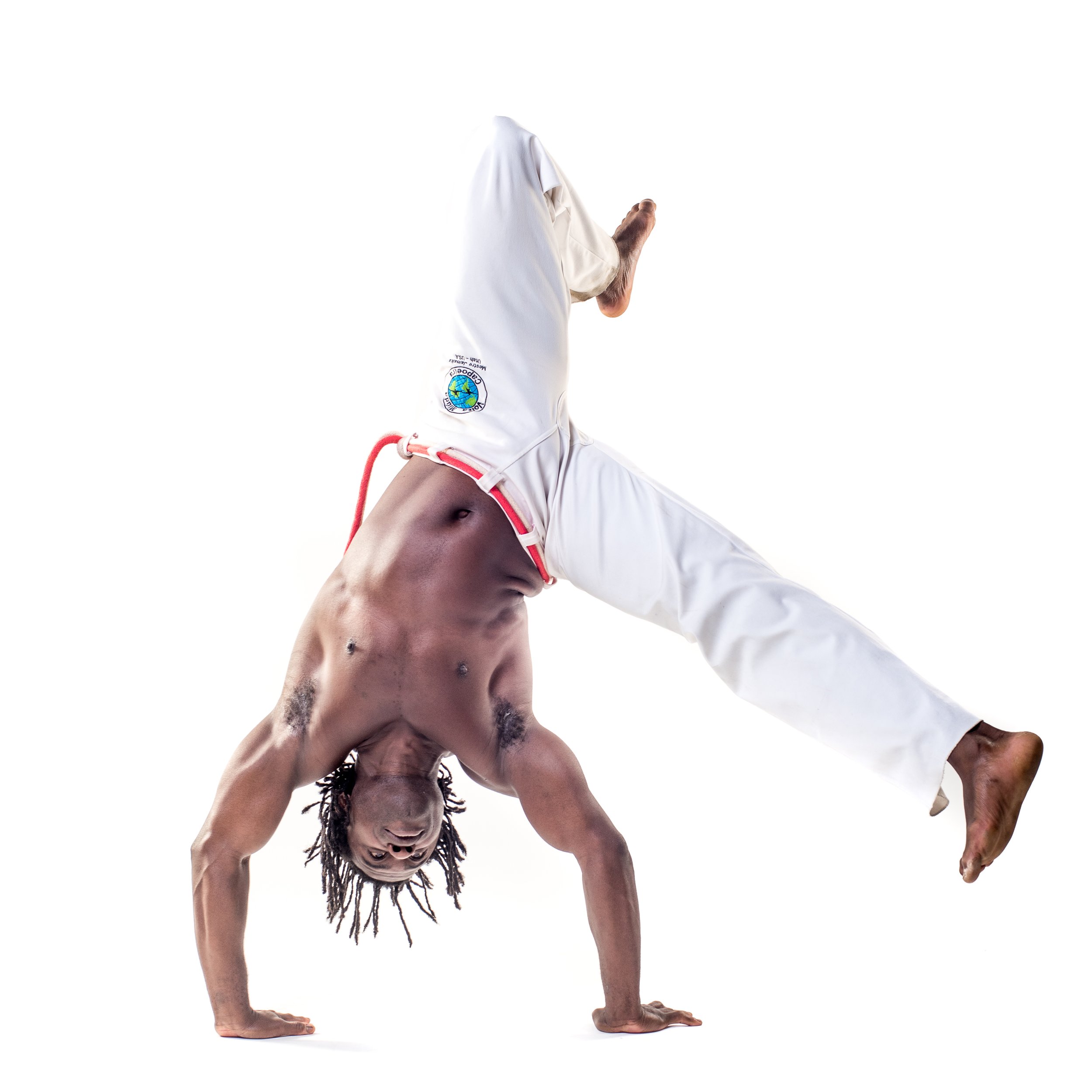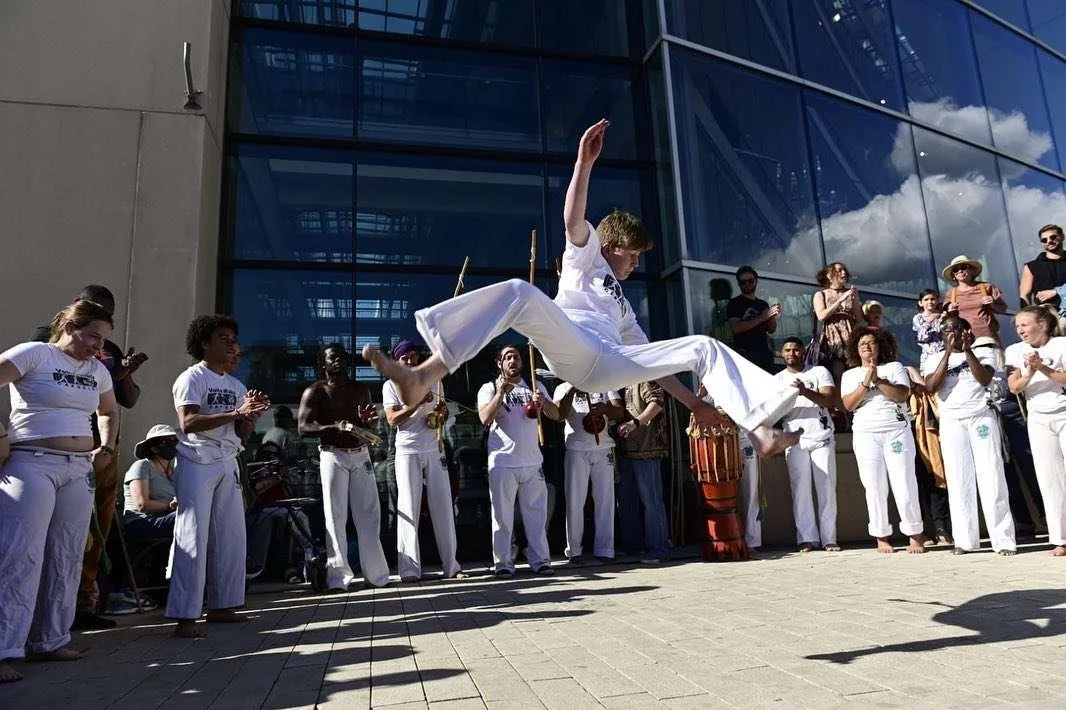Daisy Blake reported on the work Mestre Jamaika does in Salt Lake City. Here’s an excerpt:
Mestre, which means master, Jamaika found his passion for capoeira at seven, living in Teixeira de Freitas, Bahia, Brazil. He began training under Mestre Gil, of Capoeira Garras De Ouro and by age 15 was traveling throughout Brazil to train and compete, later winning three consecutive titles in the Brazilian Capoeira Confederation Championships, all before age 20.
Certified to teach under the title of “Professor” in 1997, Mestre Jamaika’s skill and acrobatic talent have since placed him among the most sought-after instructors within the capoeira community, and he has taught and performed at workshops and events throughout the world.
He also has had roles in various independent films, documentaries, and music videos, and in Shockwave’s popular Capoeira Fighter 3 video game, aptly playing a character named Jamaika.
In June of 2013, Jamaika was awarded the title of “Mestre” by Mestre Amen.
He continues to give workshops all over the United States and the world for capoeira schools as well as for arts and professional dance programs.
He told us: “Capoeira is 100% from Brazil, and it was created by the Africans when they were forced to go to the country, then they become slaves in the country, then they create capoeira as a self-defense disguised as dance.
“Capoeira is just a beautiful art form. I like to say it’s an art form because there are so many things that are involved into this; it’s music, it’s dancing, it’s culture, it’s language, but the best of all that I love the most is the community, and especially the community that we are creating here in Salt Lake City for the last 20 years working with the Utah Arts Alliance.”
Mestre Jamaika said he initially wanted to master the art form to help to support his mother.
“Later on I discovered that I could not just help my mom but I could help many people,” he said. “And that’s my mission, that’s what I’ve been doing for the last 35 years of my life.”
Mestre Jamaika also spoke about coming to Salt Lake City and starting the Volta Miúda capoeira group in 2009, named after the region his family comes from.
“In 1999, I was invited by a group of people that was teaching capoeira, actually, practicing capoeira at BYU through a capoeira club that they created,” he said. “So the club becomes so big, and then they actually need somebody who knew a little bit more about the culture.”
He applied and was given a visa. He first moved to Utah, then to Massachusetts for about a year and a half, ultimately returning to the Beehive State.
“There was something about Utah that feels like it’s a magnetic thing. I think it’s the mountains, or something, you know?” he said. “So then I came back to Utah, and I’ve been here since.”
He added: “When I first got here, it was very difficult. I didn’t speak a word in English. I had to get used to the weather, ‘cos it’s a little bit different to where I come from. Also, as an immigrant I did all kinds of jobs you can think of — pizza delivery, construction, working in a hospital — but I always had this thought in my mind that my mission in this world is to spread out this beautiful art form which is capoeira.
“So I always had that in my mind and I kept training by myself, going to parks, sometimes doing off-hours when people go to the club and then they come out of clubs. They would go to a restaurant to eat, like Denny’s, and I would be in front of Denny’s doing capoeira, playing the berimbau, doing flips, just getting people’s attention. And then slowly build up a small group of people and start training in the park and slowly just become bigger and bigger.
“And here we are today with this beautiful community. In our community, we have many kids training, women, men, old men, young men, old women, young women. I like to say capoeira is for everybody.”
He also spoke about what the art form brings to people’s lives.
“Let’s put it this way, capoeira is great therapy. When you go there, interacting with other people, clapping hands, singing, dancing, challenging each other, my class is so beautiful. When you see a parent come with their own kids and jump in a circle, playing, smiling, then go home and start competing with each other but in a good way, it could not be better than that.
“How many times I have cases of people who come to my class, and they’re kind of quiet. I can tell, something’s going on with this person. Then, six months later, the person comes to me and be like, ‘thank you so much, this community saved my life. I was about to leave this world somehow, you know, I was in a deep depression, I was stressed, and all of a sudden, being with you guys, I feel alive again.’
“Every time we go in the streets and do performance, it’s something really beautiful. It’s very entertaining to people; people just watch it and feel like, whoa, this is awesome, you know? But then people always ask a question — are you guys dancing or are you guys fighting? We like to say, we dance like a fighter and we fight like a dancer, so that’s the best way to explain capoeira, you know what I mean?”
Mestre Jamaika said he recently took a group of 10 people to Brazil to explore the culture and the country. He said he couldn’t wait to have some of his mom’s food.
“My mom is my hero, and I like to say my mom is my first master,” he said. “She is the one who taught me who I am today. Everything I use in capoeira, my ideas, my passion I have towards capoeira definitely comes from my mom.”
He said he also has learned lessons from his dad, including focusing on the present rather than the future. “I feel it’s very important to be present, at the moment,” he said. “One thing my dad always used to tell me; try and not worry about the past, because if you worry about the past, you’re just hurting yourself twice, so try to learn from the past, leave the present and prepare yourself for the future.
“So my preparation for the future is just believe in my people, and make sure the little kids that’s training in the class today, they can be a better person in the future, and they can help us change this crazy world that we are living in right now.”
Check out the whole article here: https://gephardtdaily.com/local/salt-lake-capoeira-classes-offer-life-lessons-by-way-of-balletic-brazilian-martial-art-combines-music-dance-acrobatics/


